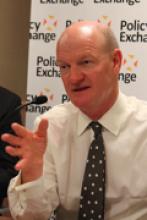‘Two Brains’ lined up for London conference

Lord Willetts, executive chair of the Resolution Foundation, former UK minister for universities and science and visiting professor at King’s College London, has been lined up as a keynote speaker at this year’s Researcher to Reader conference.
The event, to be held in London on 25 and 26 February, will see Willetts (pictured) – given the nickname ‘Two Brains’ during his time in parliament on the basis of his reputation as an intellectual – speak on the future of UK universities.
Delegates will also hear a keynote – entitled Plan S and European Research – from Dr Marc Schiltz, president at Science Europe and secretary general at the Luxembourg National Research Fund.
The event, which takes place on an annual basis at BMA House (the headquarters for the British Medical Association), is a collaborative gathering that is aimed at being the premier forum for discussion of the international scholarly content supply chain – bringing knowledge from the researcher to the reader.
Other presentations will include:
- Examining the academic lifecycle of faculty research using interview and survey data, by Christine Tulley – professor of English and director of academic career development at the University of Findlay, Ohio. This presentation draws on interviews with faculty about how they move from an idea, to research, writing and to publication, as well as survey data with academics about their writing habits, to make the case that four key trends are emerging in how faculty approach the lifecycle of publication. These trends have direct implications for how academic institutions partner with commercial tools and non-academic organisations, as well as how both traditional and non-traditional publication outlets for faculty research are affected. The presentation concludes with suggestions for realistic directions the Researcher to Reader community might take based on these findings; and
- Navigating the complexities of publishing a book-journal hybrid, using Cambridge Elements as a case study, by Nisha Doshi, senior digital development publisher at Cambridge University Press. In the publishing industry there is much talk about moving beyond the traditional boxes of journals, articles, books and chapters, but how does the industry go about that in practice? Using Cambridge Elements as a case study, this presentation will discuss the complexities of setting up a genuine book-journal hybrid, including editorial and production workflows, sales models, product design and metadata, and will present practical insights into how to overcome these challenges.
Panel discussions will include a session on machine learning in the international knowledge chain, and another dedicated to Sci-Hub and the effect it is having on scholarly communication. There will also be a series of workshops on: open access books; automating funder and researcher workflows; levelling the playing field; supporting early-career scholarship; and citation by identifier.
The event is directed by Mark Carden, a recruiter and publishing consultant, who was also chairman of the conference planning committee for the predecessor ASA Conferences in 2013, 2014 and 2015.
He told Research Information: ‘Sci-Hub represents the most comprehensive clearinghouse of illegally-obtained intellectual property in the scholarly world at the moment. It clearly represents an assault on the traditional journal publishing enterprise, and we will be debating at R2R whether, on balance, it represents a net good or a net bad for the world of scholarship and science.
‘We are delighted to have developed what we think is a strong and balanced programme for Researcher to Reader this year, with grandees like Marc Schiltz and Lord Willetts, plus real research practitioners like Christine Tulley and James Evans, and a global outlook with a speaker from Bangladesh and another from India.
‘Registrations are currently 20 per cent up over last year, and we are happy that a growing percentage of our delegates are librarians or academics.’
Sessions are expected to run from 9.30am to 5.30pm on Monday 25 February, and from 9.30am to 4.30pm on Tuesday 26 February. The workshop sessions continue over both days. There is no conference dinner, but there is a short reception at the end of the first day.
Sponsors who are supporting the 2019 Conference include HighWire Press, Atypon, Ingenta, Redlink, The Royal Society of Chemistry, MDPI, Ringgold, Wiley, Research Information and Mosaic Search.






